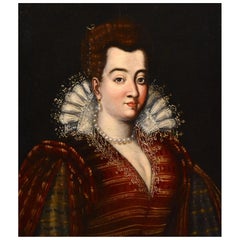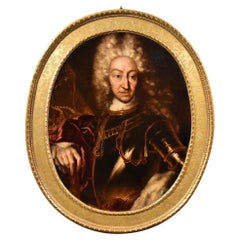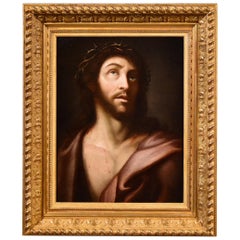Want more images or videos?
Request additional images or videos from the seller
1 of 18
Violin Player Ter Brugghen Paint Oil on canvas 17th Century flemish Old master1600-1650
1600-1650
Price:$14,673.94
$16,906.78List Price
About the Item
- Creation Year:1600-1650
- Dimensions:Height: 34.26 in (87 cm)Width: 30.71 in (78 cm)
- Medium:
- Movement & Style:
- Circle Of:Hendrick Ter Brugghen (the Hague 1588-1629 Utrecht)
- Period:
- Condition:
- Gallery Location:Riva del Garda, IT
- Reference Number:1stDibs: LU988114220762
About the Seller
4.9
Platinum Seller
Premium sellers with a 4.7+ rating and 24-hour response times
Established in 2017
1stDibs seller since 2018
260 sales on 1stDibs
Authenticity Guarantee
In the unlikely event there’s an issue with an item’s authenticity, contact us within 1 year for a full refund. DetailsMoney-Back Guarantee
If your item is not as described, is damaged in transit, or does not arrive, contact us within 7 days for a full refund. Details24-Hour Cancellation
You have a 24-hour grace period in which to reconsider your purchase, with no questions asked.Vetted Professional Sellers
Our world-class sellers must adhere to strict standards for service and quality, maintaining the integrity of our listings.Price-Match Guarantee
If you find that a seller listed the same item for a lower price elsewhere, we’ll match it.Trusted Global Delivery
Our best-in-class carrier network provides specialized shipping options worldwide, including custom delivery.You May Also Like
18th Century European Portrait of Saint John the Baptist as a Child.
Located in SANTA FE, NM
18th Century European Portrait of a Child Saint John the Baptist
Oil on Canvas
19 x 14 1/4 inches
This lovely and sensitively painting has been examined by a professional restorer w...
Category
18th Century Old Masters Figurative Paintings
Materials
Canvas, Oil
$7,600 Sale Price
20% Off
H 19 in W 14.25 in D 3 in
Portrait of Putti Playing - French 17th century art Old Master oil painting
Located in Hagley, England
This stunning French 17th century Old Master oil painting is by Baroque artist Laurent de la Hyre. It was painted circa 1645 and has excellent prove...
Category
17th Century Old Masters Portrait Paintings
Materials
Oil
$37,498 Sale Price
20% Off
H 44 in W 54 in D 2 in
Italian Greyhound and Friends - Italian 17thC Old Master dog art oil painting
By Francesco Fieravino
Located in Hagley, England
This stunning Old Master 17th century oil portrait painting is attributed to Francesco Fieravino, an artist famous in his day for still lifes and carpets. This painting which dates t...
Category
17th Century Old Masters Animal Paintings
Materials
Canvas, Oil
$57,350 Sale Price
20% Off
H 27 in W 33 in D 2 in
Portrait of William Stonestreet - Dutch Golden Age 17thC art oil painting
Located in Hagley, England
This superb Dutch Golden Age portrait is attributed to circle of Dutch artist Wybrand Simonsz de Geest. Painted in 1666 it is a full length portrait of a young William Stonestreet. He is holding the paw of a clipped little white dog with drapes and clouds beyond. (It was common practise to dress young boys in dresses up to the age of about 6 or 7 when they were 'britched' or wore britches). An excellent example of Dutch Golden Age art that wouldn't look out of place in a museum.
Wm Stonestreet 1666, Prebend of Selsely is inscribed top left.
Provenance. Berkshire estate.
Condition. Oil and canvas, 44 inches by 36 inches and in good condition.
Frame. Housed in an ornate gilt frame, 52 inches by 44 inches and in good condition.
Wybrand Simonsz. de Geest (16 August 1592 – c. 1661) was a Dutch Golden Age portrait painter from Friesland in the Netherlands. Wybrand de Geest was born and died at Leeuwarden. He learned painting from his father, Simon Juckesz, a stained glass worker. He studied later with Abraham Bloemaert. From 1614 to 1618 he travelled in France and Italy on a Grand Tour. In 1616 he met up with Leonard Bramer in Aix-en-Provence. While in Rome he became a member of the painters' circle known as the Bentvueghels. He earned the nickname 'De Friesche Adelaar', or "the Frisian Eagle". De Geest married Hendrickje Fransdr Uylenburgh in 1622, a niece of Saskia van Uylenburgh...
Category
1660s Old Masters Portrait Paintings
Materials
Oil
$26,469 Sale Price
20% Off
H 52 in W 44 in D 2 in
Portrait of a Lady with Lace Collar - British 19th century art oil painting
By Sir Thomas Lawrence
Located in Hagley, England
This very charming British 19th century Old Master portrait oil painting is attributed to the circle of Thomas Lawrence. Painted circa 1810 it is a seated half length portrait of a l...
Category
1810s Old Masters Portrait Paintings
Materials
Oil
$6,176 Sale Price
20% Off
H 44 in W 36 in D 2 in
Portrait of a Cleric - British 18th century art Old Master oil painting
By Joseph Highmore
Located in Hagley, England
This fantastic portrait oil painting is attributed to British Old Master Joseph Highmore and was painted in 1770. The half length standing portrait is of a Cleric, dressed in his wig...
Category
18th Century Old Masters Portrait Paintings
Materials
Oil
$7,168 Sale Price
20% Off
H 40 in W 34 in D 2 in
Portrait of a Woman in a red Dress - French Old Master art oil painting
Located in Hagley, England
This lovely French Old Master portrait oil painting is attributed to the circle of Jean Auguste Dominique Ingres. Painted circa 1810 it is a head and shoulders profile of a beautiful woman, resting her head on one hand. There is superb attention to detail and vibrant colouring. An excellent example of a French Old Master portrait of the period.
Unsigned.
Provenance. London estate.
Condition. Oil on canvas, 15 inches by 12 inches unframed and in good condition.
Frame. Housed in a gilt frame, 20 inches by 17 inches framed and in good condition.
Jean-Auguste-Dominique Ingres (1780-1867) was a French Neoclassical painter. Ingres was profoundly influenced by past artistic traditions and aspired to become the guardian of academic orthodoxy against the ascendant Romantic style. Although he considered himself a painter of history in the tradition of Nicolas Poussin and Jacques-Louis David, it is his portraits, both painted and drawn, that are recognized as his greatest legacy. His expressive distortions of form and space made him an important precursor of modern art, influencing Picasso, Matisse and other modernists. Born into a modest family in Montauban, he travelled to Paris to study in the studio of David. In 1802 he made his Salon debut, and won the Prix de Rome for his painting The Ambassadors of Agamemnon in the tent of Achilles. By the time he departed in 1806 for his residency in Rome, his style—revealing his close study of Italian and Flemish Renaissance masters—was fully developed, and would change little for the rest of his life. While working in Rome and subsequently Florence from 1806 to 1824, he regularly sent paintings to the Paris Salon, where they were faulted by critics who found his style bizarre and archaic. He received few commissions during this period for the history paintings he aspired to paint, but was able to support himself and his wife as a portrait painter and draughtsman. He was finally recognized at the Salon in 1824, when his Raphaelesque painting of the Vow of Louis XIII was met with acclaim, and Ingres was acknowledged as the leader of the Neoclassical school in France. Although the income from commissions for history paintings allowed him to paint fewer portraits, his Portrait of Monsieur...
Category
19th Century Old Masters Portrait Paintings
Materials
Oil
$6,065 Sale Price
20% Off
H 20 in W 17 in D 2 in
Portrait of a Young Boy Thomas Wagstaff - Scottish art 18th century oil painting
Located in Hagley, England
This superb late 18th century portrait oil painting is attributed to noted Scottish artist Alexander Nasmyth. Painted circa 1790 the sitter is of the Wagstaff family, either Thomas o...
Category
18th Century Old Masters Portrait Paintings
Materials
Oil
$7,444 Sale Price
20% Off
H 37 in W 31 in D 2 in
Portrait of Lady with Garland of Flowers - British 17thC Old Master oil painting
By Michael Dahl
Located in Hagley, England
This charming 17th century Old Master portrait oil painting is attributed to the circle of Swedish born Michael Dahl who lived and work in England for most of his life. Painted circa...
Category
17th Century Old Masters Portrait Paintings
Materials
Oil
$8,823 Sale Price
20% Off
H 38 in W 33 in D 2 in
Saint Roch with Saint Jerome + Saint Sebastian - British Edwardian oil painting
By Wilfred Gabriel de Glehn
Located in Hagley, England
This superb religious figurative oil painting is by noted artist Wilfred de Glehn. Although some experts rank de Glehn alongside Sargent, he is considered as something of a late British Renoir, for his deft use of sunlight and shadow. Indeed he was good friends with John Singer Sargent and collaborated with his on some projects. This painting, painted circa 1910 is of three saints, from left to right they are Saint Jerome, Saint Roch and Saint Sebastian. It is based on a work attributed to 16th century artist Alessandro Oliverio. Saint Jerome was a biblical translator and monastic leader and is depicted in red, holding books. Saint Roch and Saint Sebastian were known as the Plague saints - Plague saints offered hope and healing before, during, and after times of plague. A specific style of painting, the plague votive, was considered a talisman for warding off the plague. It portrayed a particular saint as an intercessor between God and the person or persons who commissioned the painting – usually a town, government, lay confraternity, or religious order to atone for the "collective guilt" of the community. Rather than a society depressed and resigned to repeated epidemics, these votives represent people taking positive steps to regain control over their environment. Paintings of Roch represent the confidence in which renaissance worshipers sought to access supernatural aid in overcoming the ravages of the plague. The thirteenth-century Saint Roch (or Rocco), whose death is still commemorated in Italy, is especially invoked against the plague. He attended plague victims in public hospitals in Italy according to traditional accounts of his life. Images attributed to the Spanish historical painter Nicolás Borrás in the Royal Cornwall Museum, or other works in institutions from The National Gallery to the Wallace Collection, show him baring his thigh to show the mark of the plague, as he is in this painting. Saint Roch is also the patron saint of dogs, after one carried food to him in the prison where he died...
Category
1910s Old Masters Portrait Paintings
Materials
Oil
$5,514 Sale Price
20% Off
H 38 in W 37 in D 2 in
More From This Seller
View AllPortrait Lady Pulzone Paint Oil on canvas Old master 16th Century Italian Roma
Located in Riva del Garda, IT
Scipione Pulzone, called Il Gaetano (Gaeta 1544 - Rome 1598) - workshop of
Portrait of Bianca Cappello (Venice, 1548 - 1587) Grand Duchess of Tuscany, second wife of Francesco I de 'Medici
Second half of the 16th century
oil on canvas, cm. 70 x 56 cm., Framed 103 x 87 cm.
The proposed painting illustrates the portrait of Bianca Cappello (Venice, 1548 - 1587), a noblewoman of Venetian origins, second wife of the Grand Duke of Tuscany Francesco I de 'Medici, whose expressive power is wisely highlighted by the composite cut of light three quarters, with the head and gaze directed at the observer. The beam of light coming from her right brings out the volumes of her face plastically and lingers on her features, highlighted by the large white lace ruff that surrounds his neck and by the details of her precious clothing.
Bianca wears a dark red dress, perhaps a zimarra, embroidered in gold with a plunging neckline and a raised collar of the shirt curled in a ruff and also edged with precious lace, embroidered with the motif of the Florentine lily.
The favorite jewels of the noblewoman were pearls: we see them on a choker that adorns the neckline, in the earrings and again in the hairstyle, which sees the hair gathered at the nape of the neck and adorned with a string of small black pearls and embellished with a clasp.
It is a high-quality painting that can be confined to the workshop of the painter Scipione Pulzone called Gaetano, representing at best a pictorial genre, that of portraiture, in which the master excelled. This attribution would be confirmed by comparisons with the numerous portraits that Pulzone dedicated to the Medici family.
Our painting, in particular, could represent one of the versions that the workshop has replicated, at the request of the numerous art collectors who wish to have a portrait of one of the most influential personalities of the Florentine scene.
The characters drawn by Pulzone were icons of incomparable elegance: noblewomen, knights and religious lent their faces to the eye of the artist who was able to grasp every meticulous detail with his superb technique. A photographic wealth and surprising material attention that trace the pictorial prototypes of Flemish inspiration, in particular of Antonis Mor...
Category
16th Century Old Masters Paintings
Materials
Oil
$9,314 Sale Price
30% Off
King Portrait Clementi Paint Oil on canvas Old master 18th Century Italian
Located in Riva del Garda, IT
Maria Giovanna Battista Clementi known as La Clementina (Turin, 1692 - Turin, 1761), Attributable to
Portrait of Victor Amadeus II of Savoy (Turin 1666 - Moncalieri 1732) king of Sardinia, duke of Savoy, marquis of Saluzzo and duke of Monferrato, prince of Piedmont and count of Aosta, Moriana and Nizza from 1675 to 1720.
Oil on oval canvas,
79 x 62 cm., Framed 98 x 82 cm.
The portrayed in this fascinating virile portrait is King Vittorio Amedeo II of Savoy, portrayed in ceremonial armor and red cloak according to the traditional courtly iconography, represented half-length, slightly three-quarter-length, with the towering "courtly" wig, according to the dictates of fashion of the first decades of the century, of French inspiration.
In order to represent the power embodied in our austere portrayal, the sovereign is immortalized with the symbolic attributes of the power of the family, identifiable in the ancient crown of the Kingdom of Sardinia, in the scepter with the Mauritian cross and in the necklace of the Supreme Order of the Most Holy Annunziata, established in 1364 by Amedeo VI, as the highest honor of the House of Savoy...
Category
18th Century Old Masters Paintings
Materials
Oil
$11,192 Sale Price
35% Off
Ecce Homo Christ Paint Oil on canvas 17th Century Old master Leonardo Italian
Located in Riva del Garda, IT
Lombard painter of the seventeenth century
Ecce Homo
Oil painting on canvas
56 x 43 cm. , framed 75 x 63 cm.
Provenance: Florence, Pandolfini, 5.10.2021, lot 209
The proposed canv...
Category
17th Century Old Masters Paintings
Materials
Oil
$6,011 Sale Price
20% Off
Portrait Sibyl Lady Zanotti Paint Oil on canvas Old master 18th Century Italian
Located in Riva del Garda, IT
Portrait of an Eritrean Sibyl who writes the prophecy
Circle of Lorenzo Pasinelli (Bologna 1629 - 1700) - Attributable to Giampietro Cavazzoni Zanotti ...
Category
18th Century Old Masters Paintings
Materials
Oil
$5,635 Sale Price
20% Off
Saint Mark Evangelist Guercino Paint Oil on canvas Old master 17th Century Italy
Located in Riva del Garda, IT
Workshop of Giovanni Francesco Barbieri, known as Il Guercino (Cento, 1591 - Bologna, 1666)
Saint Mark the Evangelist
Oil on canvas - 85 x 71 cm., Framed 100 x 86 cm.
Of great cha...
Category
17th Century Old Masters Paintings
Materials
Oil
$7,263 Sale Price
20% Off
Adoration Shepherds Von Achen Paint oil on canvas 17th Century Old master Art
Located in Riva del Garda, IT
Hans (or Johann) von Achen (Cologne 1552 - Prague 1615) workshop
Adoration of the Shepherds
Oil on canvas
112 x 90 cm./ Framed 125 x 102 cm.
The painting that we are happy to prese...
Category
17th Century Old Masters Paintings
Materials
Oil
$8,766 Sale Price
20% Off
Recently Viewed
View AllMore Ways To Browse
Musical Figures
Oil Painting Violin
Violin Player
17th Century Dress
Impressionist Paintings Of Paris Street
Abstract Impressionism
Fruit Still Life
Oil On Canvas By Edward
Large Black Painting
Large Vintage Canvas Art
Portrait Of A Lady
Puerto Rico
French Blue Painting
Lake Landscape Paintings
Village Oil Painting
Still Life With Fruits Painting
Antique Unframed Canvas Paintings
Jewish Museum


